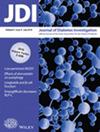Diabetes remission in newly diagnosed type 2 diabetes mellitus through short-term continuous subcutaneous insulin infusion intensive therapy combined with low-carbohydrate diet treatment
Abstract
Aim/Introduction
To evaluate the therapeutic efficacy short-term continuous subcutaneous insulin infusion (CSII) intensive therapy combined with a low-carbohydrate diet (LCD) for diabetes remission in patients with newly diagnosed type 2 diabetes mellitus.
Materials and Methods
This study included patients newly diagnosed with type 2 diabetes mellitus, who were randomly divided into two groups: conventional (conventional CSII + traditional lifestyle guidance); and intensive (intensive CSII + LCD lifestyle guidance). CSII was used for blood glucose control, with continuous glucose monitoring (CGM) used to monitor blood glucose levels. The primary outcome measure was hemoglobin A1c (HbA1c) level; secondary outcomes included body weight, body mass index (BMI), waist circumference, glycemic control, and biochemical indices.
Results
The time in range (TIR) in the intensive treatment group was greater than that in the conventional treatment group (P < 0.05). There was no significant difference in the incidence of hypoglycemia between the two groups (P > 0.05). Compared with the conventional treatment group, diabetes remission rates were significantly greater in the intensive treatment group (P < 0.05). In the intensive treatment group, fasting plasma glucose (FPG), HbA1c, Homeostasis Model assessment of Insulin Resistance (HOMA-IR), triglycerides (TG), low-density lipoprotein cholesterol (LDL-c), and changes in body weight, BMI, visceral fat area (VFA), and subcutaneous fat area (SFA) decreased significantly (P < 0.05). FPG, HOMA-IR, TG, LDL-c, and changes in body weight, BMI, waist circumference, and VFA were significantly correlated with HbA1c levels (P < 0.05).
Conclusions
The combination of intensive CSII and LCD lifestyle guidance had been improved the remission rate in patients with newly diagnosed type 2 diabetes mellitus.


 求助内容:
求助内容: 应助结果提醒方式:
应助结果提醒方式:


